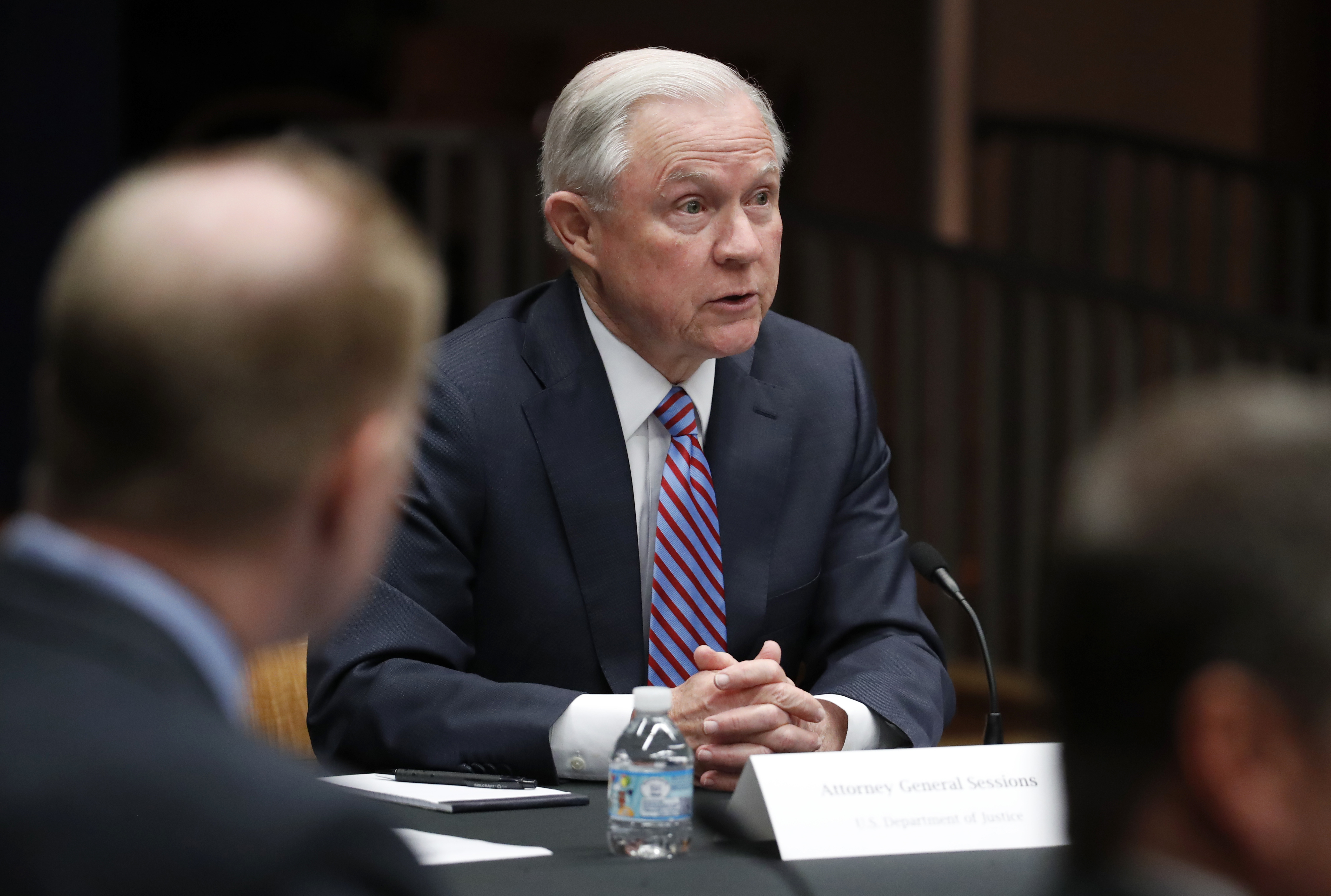Jeff Sessions is refighting the last drug war
Jeff Sessions wants to take America back to the '80s. Just say no.


A free daily email with the biggest news stories of the day – and the best features from TheWeek.com
You are now subscribed
Your newsletter sign-up was successful
Attorney General Jeff Sessions is a warrior in search of a battlefield. Unfortunately, he has the power to create one, even if the majority of the country he serves has decided that the war he thirsts for should not be fought.
With a two-page memo sent last week from the AG's office to the nation's 5,000-plus assistant U.S. attorneys, Sessions wiped away former Obama administration Attorney General Eric Holder's August 2013 directive, which ordered prosecutors to use discretion when bringing charges against defendants who did not have a history of violence, gang associations, or "significant criminal history." Holder's memo also instructed federal prosecutors to not purposefully pile on charges so as to trigger mandatory minimum sentences — which handcuff judges from exercising their own discretion — but to "evaluate these factors in an equally thoughtful and reasoned manner."
Sessions' Department of Justice (DOJ) will have no more of that thoughtfulness. Instead, America's "top cop" has essentially rebooted the war on drugs, a failed and devastating law enforcement strategy that remains unpopular with a majority of Americans (no matter their political affiliation) and that has only served to enrich drug cartels, unnecessarily divert law enforcement resources, and contribute to the tragedy of mass incarceration.
The Week
Escape your echo chamber. Get the facts behind the news, plus analysis from multiple perspectives.

Sign up for The Week's Free Newsletters
From our morning news briefing to a weekly Good News Newsletter, get the best of The Week delivered directly to your inbox.
From our morning news briefing to a weekly Good News Newsletter, get the best of The Week delivered directly to your inbox.
By affirming "a core principle that prosecutors should charge and pursue the most serious, readily provable offense," Sessions' memo turns back the clock and reimposes a "one size fits all" approach to federal prosecutions. The memo specifically cites the pursuit of mandatory minimum sentences as being part of its "moral and just" congressional mandate, and ludicrously states that treating all suspected criminals as harshly as possible no matter their individual circumstances "produces consistency."
As a result, we can reasonably expect the federal prison population — which had finally begun to dip in the late years of the Obama administration after growing by a factor of more than seven since Ronald Reagan took office — to resume its shameful rise, further burnishing the United States' title as imprisoner of more of its citizens (on both a total and per capita basis) than any of the world's most brutal authoritarian regimes.
Sessions justifies bringing back such vigorous prosecutions because he believes the minor and only very recent uptick in crime portends a return to the national crime wave of the 1980s, which incidentally was also the time of Nancy Reagan's failed zero tolerance anti-drug "Just Say No" campaign, which Sessions loves so well. To prepare for an increase in federal prisoners, which Sessions appears to view as a feature and not a bug of his policies, the AG is bringing back federal private prisons, meant in his words "to meet the future needs of the federal correctional system."
Families Against Mandatory Minimums (FAMM) released a statement in response to the DOJ's memo, stating in part, "The simple fact is that 93 percent of individuals who receive mandatory minimum sentences played no leadership role in their offense. Crafted purportedly for sharks, mandatory minimums catch lots of minnows."
A free daily email with the biggest news stories of the day – and the best features from TheWeek.com
Speaking of small fish, Sessions' well-documented and troubling attitudes about marijuana could have significant consequences in states that have liberalized their pot laws. While weed is permitted for medical purposes in more than half of the United States, and legalized recreationally in seven states plus the District of Columbia, it remains illegal federally and also absurdly classified by the Drug Enforcement Administration (DEA) as a Schedule I narcotic — the classification reserved for substances with a high probability for abuse and no accepted medical use. Just last year, Sessions said he would like "to send that message with clarity, that good people don't smoke marijuana," and now that he is endowed with the broad discretion of one of the most powerful Cabinet positions and best-resourced federal agencies, there's little to stand in the way of Sessions' throwback crusade.
Sessions' call for a return to the over-prosecution of the bad old days is terrible but unsurprising, considering the president he works for — you know, the one who inexplicably invoked his perception of present day "American carnage" in his inaugural speech. And the AG's lust for punitive sentencing is nothing new. He once proposed a bill while serving as Alabama attorney general that would have allowed the state to execute repeat-offending drug dealers (see pg. 155 of the May 1996 issue of Alabama Lawyer).
It took a long time for an American public that was long terrified of drugs and crime to come around to the reality that the nearly half-century-long war on drugs was, in fact, a war on ourselves, and that locking up non-violent drug offenders ruined lives, destroyed families, and disproportionately afflicted the most vulnerable among us by creating an underclass forever branded with the stain of conviction and imprisonment.
American attitudes have changed, but America's "top cop" remains stuck in a time where he imagines his preferred policies actually succeeded.
Anthony L. Fisher is a journalist and filmmaker in New York with work also appearing at Vox, The Daily Beast, Reason, New York Daily News, Huffington Post, Newsweek, CNN, Fox News Channel, Sundance Channel, and Comedy Central. He also wrote and directed the feature film Sidewalk Traffic, available on major VOD platforms.
-
 ‘Restaurateurs have become millionaires’
‘Restaurateurs have become millionaires’Instant Opinion Opinion, comment and editorials of the day
-
 Earth is rapidly approaching a ‘hothouse’ trajectory of warming
Earth is rapidly approaching a ‘hothouse’ trajectory of warmingThe explainer It may become impossible to fix
-
 Health insurance: Premiums soar as ACA subsidies end
Health insurance: Premiums soar as ACA subsidies endFeature 1.4 million people have dropped coverage
-
 The billionaires’ wealth tax: a catastrophe for California?
The billionaires’ wealth tax: a catastrophe for California?Talking Point Peter Thiel and Larry Page preparing to change state residency
-
 Bari Weiss’ ‘60 Minutes’ scandal is about more than one report
Bari Weiss’ ‘60 Minutes’ scandal is about more than one reportIN THE SPOTLIGHT By blocking an approved segment on a controversial prison holding US deportees in El Salvador, the editor-in-chief of CBS News has become the main story
-
 Has Zohran Mamdani shown the Democrats how to win again?
Has Zohran Mamdani shown the Democrats how to win again?Today’s Big Question New York City mayoral election touted as victory for left-wing populists but moderate centrist wins elsewhere present more complex path for Democratic Party
-
 Millions turn out for anti-Trump ‘No Kings’ rallies
Millions turn out for anti-Trump ‘No Kings’ ralliesSpeed Read An estimated 7 million people participated, 2 million more than at the first ‘No Kings’ protest in June
-
 Ghislaine Maxwell: angling for a Trump pardon
Ghislaine Maxwell: angling for a Trump pardonTalking Point Convicted sex trafficker's testimony could shed new light on president's links to Jeffrey Epstein
-
 The last words and final moments of 40 presidents
The last words and final moments of 40 presidentsThe Explainer Some are eloquent quotes worthy of the holders of the highest office in the nation, and others... aren't
-
 The JFK files: the truth at last?
The JFK files: the truth at last?In The Spotlight More than 64,000 previously classified documents relating the 1963 assassination of John F. Kennedy have been released by the Trump administration
-
 'Seriously, not literally': how should the world take Donald Trump?
'Seriously, not literally': how should the world take Donald Trump?Today's big question White House rhetoric and reality look likely to become increasingly blurred
